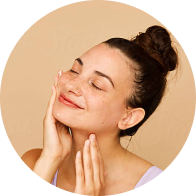
With so many skincare products available promising different benefits, it can be overwhelming trying to choose the right skin treatment products for your skin. From retinols to exfoliants and toners to eye creams, how do we know what our skin needs? And how do we make sure we’re choosing the right products?
This blog will explore how you can make sure a product is right for your skin before you invest, and the top 5 skincare ingredients to avoid. Let us here at MiQuest guide you through the sea of skincare confusion and light the path to healthy, confident skin.
1. Understand Your Skin Type:
Identifying your skin type is essential to selecting the right products. Whether your skin is oily, dry, combination, or sensitive, by recognising your skin’s unique characteristics, you can tailor your regimen to give it exactly what it needs.
When you understand your skin’s tendencies, you can choose products with the right active ingredients in skincare that balance moisture levels, control oiliness, or soothe sensitivity where needed.
2. Do Your Research on Ingredients:
Arming yourself with knowledge about skincare ingredients is key to making informed decisions. Research which ingredients to avoid and which are beneficial for your skin type, whether it’s azelaic acid and niacinamide, hyaluronic acid and retinol, or other ingredients.
3. Identify Your Needs:
Assess your skin’s current condition and prioritise your skincare goals. Whether you’re targeting acne, fine lines and wrinkles, or simply seeking to optimise your skin’s health, selecting products tailored to your specific concerns will ensure you’re targeting them effectively.
Additionally, by identifying your skin’s priorities, you can streamline your routine and avoid using any unnecessary products that may overwhelm or irritate your skin.
4. Patch Test:
Before using a new product all over your face, whether it’s prescription anti wrinkle cream or prescription melasma treatment, it’s wise to conduct a patch test to check for any adverse reactions. Apply a small amount of the product to a discreet area of skin, such as the inner wrist or behind the ear, and monitor for any signs of irritation or sensitivity over the next 24-48 hours.
This simple step can help prevent potential irritation and allows you to make informed decisions about using specific products in your routine.
5. Try a Skin Ingredient Checker
There are many excellent online resources and mobile apps that check skincare ingredients to aid the selection process. These tools offer valuable information about what’s in the products we use and highlights harmful ingredients that can actually make our skin – and our overall health – worse.
By separating the good skin care products from the not so good ones, we’re not only educating ourselves on safe active ingredients in skincare, but we drastically enhance the effectiveness of our regimens.
6. Consult a Skincare Professional:
If you're unsure about how to choose the right skincare products, don't hesitate to seek guidance from skincare professionals or dermatologists like the experts here at MiQuest. We’ll assess your skin using advanced AI and formulate a unique prescription just for you to achieve the results you’ve been longing for.
Top 5 Skincare Ingredients to Avoid
You may be surprised at how many harmful ingredients are lurking in some of our favourite skincare products. Let’s take a look at the top 5 skincare ingredients to avoid...
1. Formaldehyde
Used as a preservative in products like anti-ageing creams, formaldehyde can wreak havoc on your skin. From irritation and allergic reactions to respiratory issues, the adverse effects of formaldehyde mean it is a key ingredient to avoid in skincare products. Research has shown it can even contribute to the development of cancer. By avoiding formaldehyde, not only are you protecting your skin, but you’re protecting your overall health too.
2. Parabens
Parabens are also used a preservative skincare ingredient, and although effective in extending the shelf life of products, this ingredient has significant drawbacks with long-term exposure.
Parabens mimic oestrogen, which can potentially contribute to hormone disruption in the body and affect reproductive systems like menstruation and pregnancy. This damaging ingredient, commonly found in moisturises, has also been linked to breast cancer. Opting for paraben-free alternatives ensure your skincare rituals promote optimal health instead of compromise it.
3. Phthalates
Phthalates, which enhance plastic flexibility and carry fragrances, raise some quite alarming health concerns. They’ve been linked to DNA and organ damage, and the disruption of the body’s immune and reproductive systems.
Additionally, prenatal and postnatal exposure to phthalates has been associated with neurodevelopmental effects in children. This highlights the importance of precautionary skincare measures when family planning, such as opting for organic baby skincare and pregnancy-safe makeup.
4. Sodium Lauryl Sulfate (SLS)
Potentially causing eye, skin, and lung irritation, sodium lauryl sulfate is used as a lathering agent in products like cleansers and shampoos. Although SLS is not considered to be carcinogenic, prolonged exposure may compromise the skin's barrier function, leading to increased sensitivity and potential disruption of the skin microbiome.
By avoiding skin treatment products containing sodium lauryl sulfate, you can preserve your skin’s equilibrium for a reliable balance between cleanliness and skin health.
5. Oxybenzone
While sunscreen is essential for protecting the skin from harmful UV rays, sometimes the ingredients can do more damage than good. Oxybenzone is a common chemical sunscreen agent that has been linked to hormone disruption, allergic reactions, and coral reef damage.
Oxybenzone has also been detected in human breast milk, raising concerns about its accumulation in the body and impact on infant health. Choose mineral-based sunscreens or those formulated with alternative UV filters instead for effective sun protection without the potential risks.
When it comes to choosing the right skincare products, it’s evident the way to do it is by understanding what your unique skin type needs and making sure you’re informed on good skincare products with safe and effective ingredients. This way, you can nourish your skin with the care it deserves – it is the body’s largest organ after all. With this guide, you can put an end to the guessing games, and say hello to a lifetime of healthy, radiant skin!
Whether you’re looking for prescription cream for rosacea, UK melasma cream, or something entirely different, we’re confident our personalised formulas here at MiQuest will transform your skin, your confidence, and your overall well-being. Get in touch today to find out what we can do for you and your skin.






AI-Empowered Dermatology, Personalised For You.






